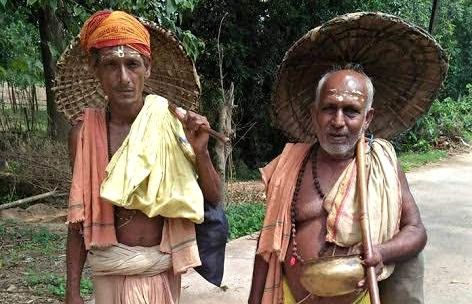Keonjhar: Traditions persist over years as they are passed on to posterity through socialisation. However, we have left behind the typical ‘Chakulia Panda’ tradition which was seen only in Odisha in our march towards modernity.
‘Chakulia Panda’ is a Vaishnavite sect (devotees of Vishnu). They are devotional bards who are rarely seen on streets these days. Only male members roam from door to door reciting religious compositions from ancient Odia literature in colloquial dialect.
They never ask for anything in return, but gladly receive rice and vegetables offered to them as alms at households. They are believed to be lower class Brahmins. At times, they act ‘Suanga’ (humorous plays) on various contemporary social issues.
Tradition of Chakulia Panda (round-bellied priest) is very unique to coastal districts. Usually, they put on sandalwood paste on their foreheads, wear turbans (Pagadis) and hold ‘Chhatris’ (palm-leaf umbrellas), to protect themselves from tropical heat and rain.
They are attired in saffron clothes and carry Gamchha (loin-cloth) shaped like a carry-bag (Jhula), which is meant to collect alms. It is not unusual for a Chakulia Panda to have a companion during tour.
As soon as one finishes a stanza the other one takes over and recites, complimenting each other. On occasions, one of them plays Kendera (a country-made musical instrument) to the tune of his companion.
Offering alms to a Chakulia Panda is considered a pious act as compared to that of a hundred Brahmins. On top of Daana (donation), a few coins as Dakshina (tips) are usually given to Chakulia Panda.
As they lost their livelihoods, the Chakulia Panda tradition gradually withered away and delimited their visits to Odia households. This typical tradition which correlates to ancient Odia cultural heritage was enriching our religious fervour and is now on the verge of extinction.
Two Chakulia Pandas namely Hadibandhu Dash and Rashmi Kumar Dash who are on tour these days to Keonjhar town from Kantilo area in Nayagarh district said, “We usually visit different districts of the state during Raja Sankranti, months of Kartika and Ashwina”.
Earlier, we used to roam in a group of four to five persons, along with our father and other male siblings. Earning at least Rs 200 to Rs 300 a day has become very difficult for us these days, the duo added.
While it is commonly assumed that traditions have linkage with ancient history, many traditions have been invented by human societies on purpose, whether those are social, political, economic or cultural.






































